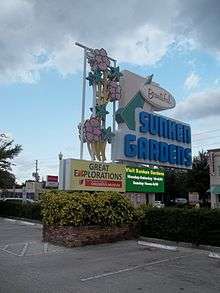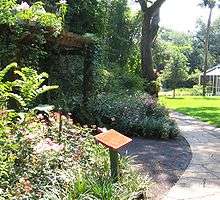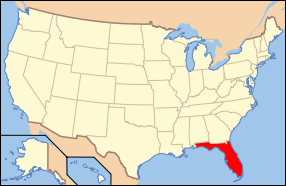Sunken Gardens (Florida)


The Sunken Gardens are 4 acres (1.6 hectares) of well-established botanical gardens, located in the Historic Old Northeast neighborhood of St. Petersburg, Florida, at 1825 4th Street North. The Gardens have existed for more than a century, and are one of the oldest roadside tourist attractions in the United States. The Gardens are now operated by the City of St. Petersburg, FL and maintained with the help of volunteers. Sunken Gardens are open to the public every day of the week. An admission fee is charged for entrance into the gardens and a yearly membership is also available.
Sunken Gardens retains their historical interest as an important example of a 1930s Florida roadside commercial attraction, and is probably the oldest commercial tourist attraction on Florida's west coast. The Gardens are open to the public for educational programs, tours, and special events, particularly weddings which have taken place for decades on the Wedding Lawn,[1] and in the banquet facilities in the Garden Room overlooking the unique garden setting.
.jpg)
History
The Gardens began in 1903, when plumber and avid gardener George Turner Sr. purchased the site, including a shallow lake 10 feet (3.0 m) below sea level, which he drained to form his private "sunken" garden. Turner started planting papayas and citrus fruits along with other exotic plants on the rich soil surrounding his home. By the 1920s, Turner had opened a nursery and began selling fruits, vegetables, roses and other plants, and visitors were paying a nickel each to stroll through the gardens. In the fall of 1935, he fenced his garden and started charging an admission fee of 25 cents. The Gardens eventually became widely popular, and from the 1950s through the 1970s were ranked among Florida’s top ten commercial attractions.
Historic Building Status
|
Sanitary Public Market | |
  | |
| Location | St. Petersburg, Florida |
|---|---|
| Coordinates | 27°47′24″N 82°38′18″W / 27.79000°N 82.63833°WCoordinates: 27°47′24″N 82°38′18″W / 27.79000°N 82.63833°W |
| Architectural style | Mission/Spanish Revival |
| NRHP Reference # | 02000680[2] |
| Added to NRHP | June 27, 2002 |
The Gardens include a large building originally known as the Sanitary Public Market, first constructed in 1926-27, and designed by architect Albert Lee Hawes. It was a Mediterranean Revival style arcade with twin Moorish towers, cast stone trim, and a tile roof. In 1940, it was converted for use as the Coca-Cola Bottling Company, and restyled in Art Moderne. The Turner family purchased the building in 1967 to create the World’s Largest Gift Shop and the King of Kings Wax Museum, adding faux lava portions at that time. In 1999, it was purchased by the City of St. Petersburg, along with the adjoining gardens, using a voter-approved tax.[3] The Gardens were designated as a local historic landmark and treated to several years' efforts of restoration. On June 27, 2002, the former Sanitary Public Market building was added to the U.S. National Register of Historic Places, and is now the home of a children's science museum called Great Explorations.
Flora and fauna
The Gardens currently contain over 500 species of tropical and subtropical plants amidst pools and cascading waterfalls, lushly planted in a collection of more than 50,000 tropical plants and flowers. They include a Japanese garden, cactus garden, and butterfly garden, and Chilean flamingos. Plants include bougainvilleas, royal palms, water lilies, shrimp plants, and fruit trees. The garden atmosphere is peaceful and many of the plants are quite large (compared to typical specimens) due to their long history of protection and cultivation.
Chilean Flamingos
In 2016, Sunken Gardens acquired a new young flock of 20 Flamingos from the San Antonio Zoo.[4][5] They joined elderly flamingo residents, George and Lucy, the two remaining Chilean flamingos from the original 17 bird flock that have been on exhibit since 1956. The new flamingos were purchased with funds raised by a nonprofit group, Flamingos Forever, composed of volunteers.[6][7] Additionally, the city purchased a $30,000 nighttime enclosure for the new flock. Flamingos Forever changed their name to Sunken Gardens Forever, after the acquisition of the new flock, and St. Petersburg Mayor Rick Kriseman named May “Sunken Gardens Forever Appreciation Month” in St. Petersburg, FL, in honor of their fundraising efforts.[8]

Programs for Lifelong Learning
Sunken Gardens offers six programs for children and adults. For children they offer a photography program entitled “Cameras and Kids” where children learn basic photography skills and how to take better photographs with their own camera or smartphone. They also offer a “Flamingo Forever” program, where children learn about flamingos, visit the flamingos, and then play games and create crafts. The adult horticulture programs include “Propagation Techniques,” “Grow Microgreens,” “Rain Gardens and Barrels,” and an orchid program, “Think Outside the Pot: Mounting Orchids.” Programs are free with membership and are included with paid admission.[9]
See also
References
- ↑ "Sunken Gardens wedding continues family tradition". Tampa Bay Times. Retrieved 2016-07-17.
- ↑ National Park Service (2010-07-09). "National Register Information System". National Register of Historic Places. National Park Service.
- ↑ "History - St. Petersburg". www.stpete.org. Retrieved 2016-07-17.
- ↑ St. Petersburg, FL (2016-04-26), Sunken Gardens Welcomes New Flamingos, retrieved 2016-07-17
- ↑ FOX. "20 new flamingos join the Sunken Gardens family". Retrieved 2016-07-17.
- ↑ "Group wants to raise $60,000 to restore Sunken Gardens flamingo flock". Retrieved 2016-07-17.
- ↑ "Flamingos Forever | Facebook". www.facebook.com. Retrieved 2016-07-17.
- ↑ "New flock of flamingos arrives at Sunken Gardens". Retrieved 2016-07-17.
- ↑ "Workshops - St. Petersburg". www.stpete.org. Retrieved 2016-07-17.
External links
- Official website
- Official Facebook Page
- Historic Sunken Gardens at Florida's Office of Cultural and Historical Programs
- Sunken Gardens at Tampa Bay Regional Planning Council

